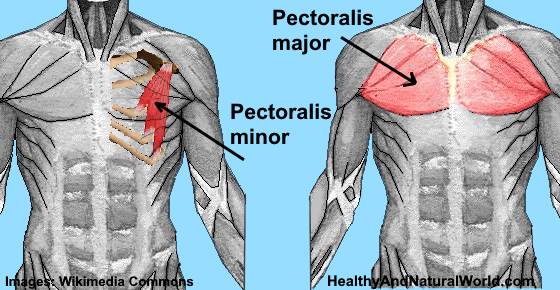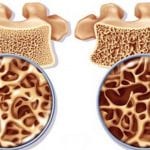Pulled muscles in the chest can cause mild to excruciating pain in your upper body. You have two large muscles on either side of your chest – the pectoralis major and pectoralis minor, which are sometimes referred to as your “pecs.” A pulled chest muscle can cause a sharp severe pain that radiates to your shoulder or arm. Because of this, the symptoms of pulled, strained, or torn muscles in the chest can be similar to a heart attack. Of course, it’s important to have any pains in your chest checked out especially if there is no discernible cause and the chest discomfort is accompanied by other symptoms.
Generally, pulled and strained muscles in your chest happen because of too much physical exertion. Depending on the severity of the injury, the symptoms of a pulled chest muscle can range from a slight twinge in your chest to severe pain if the pec muscle has become torn. Usually, athletes are at more risk from pulling muscles in their chest. However, older people and young children are also at risk from falling which could injure their upper body muscles.
Pain from a pulled muscle could affect your everyday activities like cooking, lifting objects, driving your car, or other actions that involve your arms.
This article looks at the various reasons for pulling a chest muscle and how to spot the symptoms of chest muscle pain. This is important in order to differentiate between heart attack symptoms and strained chest muscle discomfort. You will also find practical ways to treat pulled pectoral muscles at home to help them heal quickly and relieve any discomfort your pecs are causing.
The different practical method you can use to treat this problem includes self-massage, applying ice packs, and using CBD oil. CBD oil is known for its anti-inflammatory properties and thus acts as a natural remedy to this problem. In this many of them are not aware of the benefit of the CBD oil. This is the latest solution available in the market. Easily you can buy CBD oil from the online stores without leaving your home.
Muscles in Your Chest
Your pectoralis major and pectoralis minor muscles make up most of the muscle mass in your chest. According to the Encyclopaedia Britannica, your pectoralis muscles are connected to your breastbone and your upper arm and shoulders. These muscles are involved in almost all arm movements and are needed for strength – for example, pulling yourself up, lifting heavy objects, or doing pushups and other exercises.
It is generally not common for healthy persons to tear their chest muscle. According to the journal Orthopedics, serious pec muscle injuries are mostly suffered by athletes or people who train in the gym. Most of the time, pulling a muscle in your chest happens during bench press or weight lifting. These types of chest muscle injuries result in loss of motion, pain, and discomfort in relation to the severity of the injury.
Signs and Symptoms of Pulled Chest Muscles
One of the most common symptoms of pulling a chest muscle is pain around the affected muscle. This may also radiate to the shoulder, arm, or even cause abdominal discomfort.
Dr. William Blahd on WebMD says that pulled muscle, strains, and tears can damage the muscle fibers and tendons. If the muscle is severely pulled, it may damage surrounding blood vessels and cause bleeding under the skin and bruising. This can cause pain even when you are not moving your arms or shoulders. A severe chest muscle pull may even result in not being able to use your arms at all while the muscle heals.
Pectoral muscle strains are grouped into grades depending on the severity of the muscle damage. According to the journal Joints, muscle damage is graded into 3 categories as follows:
Grade I chest muscle strains happen when parts of the chest muscle are pulled and tear a small number of fibers. This results in localized pain but won’t affect your ability to continue sporting activities.
Grade II chest muscle pulls happens when a larger number of muscle fibers are torn. This will cause more chest pain and may affect limb movement, for example, the ability to stretch or rotate your arm. It may be painful to touch the pulled chest muscle and may affect your ability to continue any strenuous physical activity.
Grade III chest muscle injuries are the most serious and occur when the pectoral muscle has been severely ruptured. This will cause a lot of pain in the chest, shoulder, arm, and back. You may also notice bruising if the injury has ruptured small blood vessels in the chest. According to the Journal of Trauma, grade III pectoralis muscle injuries may require surgical repair to prevent permanent damage and disability.
Causes of Pulled Muscles in Chest
Although injury is the most common cause of pulling your chest muscles, there are other factors that can contribute to pulled chest muscles. First of all, let’s look in more detail at the types of injuries that can tear your pecs.
Injury
According to Dr. Russell Warren from the Hospital for Special Surgery, pectoralis muscle injuries happen when there is too much force or weight on the muscle. Injury to the chest muscles often occurs when the arm is extended. The most common reason for injury is performing bench presses.
However, Dr. Warren says that engaging in sports like football, hockey, rugby, wrestling, and skiing can result in mild to traumatic injuries to your upper chest.
So, any kind of strenuous physical activity that involves an outstretched arm that gets pulled, wrenched, or jerked suddenly could pull a muscle in your chest.
Repetitive injury strain
Some repetitive strain injuries are less traumatic to the chest muscles but can still result in mild pain and discomfort.
According to the website PhysioAdvisor.com, putting strain on your chest muscles over a long period of time could gradually weaken them. This could cause symptoms of a muscle pull in the chest. However, the repetitive strain on your pecs could weaken them to such a degree that you are at more risk of a pectoral muscle injury.
Age
Age can have an indirect effect on pulling a muscle in your chest. As we age, our muscles, tendons, and ligaments lose some of their elasticity and strength. This can increase the risk of pulling a chest muscle if you fall with an outstretched arm.
Pulled Muscle in Chest or Heart Attack?
Very often, many people worry about a heart attack if they have chest pain. Sometimes, identifying the real cause of chest pain or pain under the ribs can be difficult. Your chest contains many organs, muscles, and bones that can be affected by different medical conditions. However, you should never ignore chest pain as it could be the first sign of a heart attack.
READ: Use This Common Ingredients To Stop A Heart Attack in 60 Seconds
How can you tell the difference between chest pain caused by a pulled muscle or a heart attack? Doctors from the Mayo Clinic advise that you should seek emergency medical help if you have any kind of chest pain lasting for more than a few minutes.
The American Heart Association say that the warning signs of a heart attack are:
- Chest discomfort that feels like a weight is pushing on or squeezing your chest. This chest pain may come and go and will usually last for more than a few minutes.
- Radiated pain to your left arm (although the pain may be felt in both arms, neck, jaw, or shoulders).
- Shortness of breath may accompany chest discomfort, although you may feel no pain at all.
- Cold sweats.
- Nausea.
- Lightheadedness.
Researchers from Harvard Medical say that there are some ways to tell chest muscle pain apart from cardiac pain. For example, chest pain that is worse when coughing, that only lasts a few seconds, or gets worse when the chest is pressed is less likely to be a symptom of cardiac pain. However, it is always better to err on the side of caution and have the pain checked out.




Hi, I am experiencing this exact pain, and it has to a point where I get a sharp pain on the Pectoralis upper muscle (without even making any movement). Been going to several GPs, and they say there is nothing wrong with me. Even went to lunch tests, and all is clear.
Which specialist should I consult for such a pain?
Amazing article!